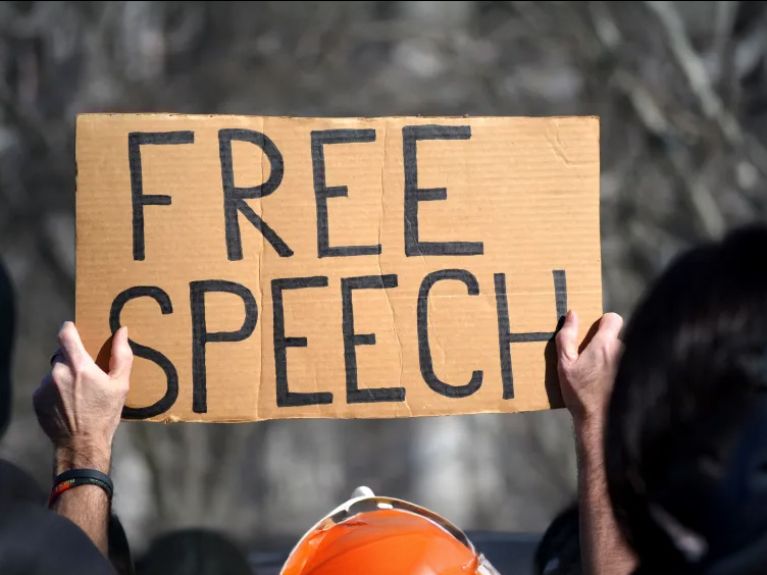Where do the limits on freedom of expression begin?
Freedom of expression is a fundamental right in Germany – but it still has its limits. Putting this much-debated issue into context.

Opinions can differ when it comes to freedom of expression. U.S. Vice President J. D. Vance sparked controversy with his speech at the Munich Security Conference in February 2025. This was because he questioned values shared by Europe and the USA: he appears to believe that freedom of expression is under threat in Germany and other European countries. Later, Vance doubled down on the platform X, accusing the German judiciary of criminalising free speech. “Insulting someone is not a crime, and criminalising speech will put a real strain on European-American relations,” he wrote.
Vance was referring to a report by US broadcaster CBS. The programme 60 Minutes shows how Germany is taking action against hate speech and insults on the internet. Since then, there has been more debate than ever on social media about freedom of expression and its limits – a good reason to provide an overview of the legal framework in Germany and the EU.
Freedom of expression in German law
Freedom of expression is a central fundamental right in Germany, enshrined in Article 5 of the Basic Law, i.e. the German constitution. It guarantees everyone the right to freely express and disseminate their opinions in speech, writing and images. This also includes freedom of the press: there is no censorship. Millions of people in Germany exercise this right every day – whether in personal conversations and political debates, at demonstrations, or in controversial discussions on social media.
Broad scope
There is broad scope here: political utterances or other expressions of opinion are generally protected even if they are polemical or exaggerated. The Federal Constitutional Court ruled that the statement “Soldiers are murderers” falls under freedom of expression, for example. In addition, satire – by cabaret artists or caricaturists, for instance – not only falls under freedom of expression, it is also protected as artistic freedom (Article 5(3) of the Basic Law). Case law emphasises that satire is permitted in order to provoke social debate through exaggeration, irony and provocation. Many German comedians sometimes make fun of politicians by means of crude jokes – without having to fear any sanctions.
Limits on freedom of expression
Freedom of expression reaches its limits where it collides with other rights and laws. Restrictions arise in connection with personal rights, the protection of minors and the right to personal honour. Insults, hate comments, defamation and racist, antisemitic and anti-constitutional statements are examples of criminal offences that do not fall under freedom of expression. This also includes the publication of the symbols and slogans belonging to extremist groups. There is a particular sensitivity towards right-wing extremist statements due to Germany’s historical responsibility. The denial of the Holocaust in particular is seen as an attack on the fundamental values of the Federal Republic of Germany, which is why it is a punishable offence. The dissemination of lies or fake news can also be punishable in certain cases, such as if they constitute defamation or incitement to hatred. There is always a need to assess carefully where freedom of expression ends and criminal liability begins. For this reason, public prosecutors and courts have to carefully weigh up the differing legal interests in each individual case.
Diverse investigations
The decisions of the judiciary and the actions of the investigating authorities can vary considerably and are the subject of lively public debate – again an expression of freedom of opinion. For example, raids were recently carried out on around 50 people suspected of spreading hate speech online – mostly politically motivated and partly antisemitic. Another recent example is the use of the slogan “From the river to the sea, Palestine will be free” at a Berlinale event: this was criticised as antisemitic and resulted in investigations by the State Security Service.
The Künast case
A lawsuit filed by Greens politician Renate Künast is of legal relevance here. This concerns a meme that shows a picture of Künast with an alleged quote: “Integration starts with you, as a German, learning Turkish.” The meme was published on Facebook in different versions and shared many times. Künast never said this sentence and has provided evidence to refute it – she is suing for an injunction and damages. The legal question which is now being heard by the Federal Court of Justice (BGH) is as follows: what rights do people have if false claims about them are spread on online platforms? The BGH first wants to await an upcoming decision by the European Court of Justice in a similar case.
What legal framework applies in Germany and the EU?
Since February 2022, social networks in Germany have not only had to delete criminal content, they have also had to report it to the Federal Criminal Police Office. The Central Reporting Unit for Criminal Content on the Internet (ZMI) was set up for this purpose. The Digital Services Act (DSA) came into force throughout the EU in February 2024. Creating a standardised legal framework across Europe, this law applies to all providers of digital services. Among other things, it obliges the providers of online platforms to enable their users to report illegal content. Since mid-May 2024, Germany has adapted its previous national regulations to the EU-wide DSA regulations through the Digital Services Act (DDG).
Germany compared to other countries
Globally speaking, Germany is undoubtedly regarded as a democratic constitutional state that allows great freedom of speech. In international rankings on freedom of the press and freedom of expression, Germany regularly occupies one of the top places – 10th in the 2024 World Press Freedom Index by Reporters Without Borders, for instance. Countries around the world have found different ways to enforce the same rights on the internet that apply offline. Unlike many other countries, possible restrictions on freedom of expression in Germany are subject to careful judicial review and must be compatible with the Basic Law.

